An end to on-the-job sexual harassment and assault
By TIM ROWDEN
Editor
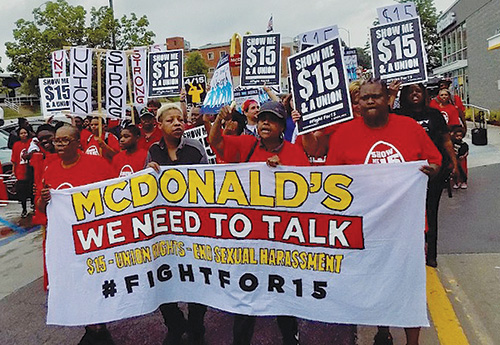
McDonald’s workers across the nation walked out May 23, demanding $15 and a union, and an end to sexual harassment and assault on the job in the Fight for $15 movement’s first McDonald’s-only strike action, coinciding with the fast-food giant’s national shareholders meeting in Dallas, Texas.
The demonstrations also coincided with last week’s filing of 25 new sexual harassment charges and lawsuits – in 20 cities across the country – against McDonald’s, alleging sexual harassment in both the corporation and its vast chain of franchise restaurants.
The lawsuits and U.S. Equal Employment Opportunity Commission (EEOC) charges were brought by the Fight for $15 organization, with legal support from the ACLU and the firms of Altshuler Berzon LLP and Outten & Golden LLP, and financial support from the TIME’S UP Legal Defense Fund™, which is housed and administered by the National Women’s Law Center Fund.
The allegations are appalling. In several instances, women reporting harassment faced retaliation, including being fired or given fewer work hours.
For example, a single mother in Kansas City, Missouri, was forced to quit her job after being accused of setting up her area manager when she reported the repeated sexual harassment she endured by him.
It takes courage to report abuse in such a hostile environment, or go on strike when you are living paycheck-to-paycheck and don’t yet have the protection of a union. But St. Louis area workers had some backup.
Local union members, allies and faith leaders turned out in force to show their support for the workers, including representatives of Service Employees (SEIU) Local 1, Laborers Local 110, the Coalition of Black Trade Unionists (CBTU), United Food and Commercial Workers (UFCW), Faculty Forward, the A. Philip Randolph Institute (APRI), Communication Workers (CWA), United Media Guild and Jobs with Justice.
“These workers are doing all of this without a union,” said Stanley Jackson, community coordinator for Show-Me $15, the St. Louis chapter of the Fight for $15 movement. “We need as many boots on the ground as we possibly can get to help them to accomplish what they have been fighting for.”
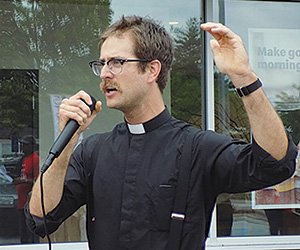
SOLIDARITY
That’s what happened last week, when more than 100 workers and their allies marched to the McDonald’s at 1420 Hampton Ave. in south St. Louis to demand fair wages, union recognition and an end to sexual harassment and physical assault on the job.
“I am honored to stand in solidarity with you for what you deserve, which is a minimum of $15 an hour and the right to form a union,” said the Rev. Jon Stratton, rector of Trinity Episcopal Church in the Central West End. “I am standing in solidarity with you because the struggle of the workers is a moral struggle. It is not right for McDonald’s and other corporations to put profits over people. It is not right for folks to get rich by taking advantage of you. Because they would not have their money without your labor.”
IT STARTS WITH THE PAYCHECK
The challenge for fast-food and other low-wage workers starts with a paycheck.
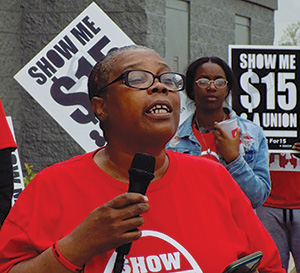
Even after Missouri voters last year approved raising the state’s minimum wage, Frances Holmes, a 56-year-old McDonald’s worker from St. Louis, says the $10 an hour she makes today, though an improvement, still isn’t enough.
“My salary isn’t enough,” Holmes said. “Once I pay my rent, pay my light bill, there’s probably a little something left, $50 or $60 to get groceries for the month. McDonald’s needs to hear what we have to say. My face is swollen because I need to go to the dentist, but I can’t afford to go to the dentist because I don’t make enough money. So I’ve got to suffer through the best I can.”
‘MARCH THERE TOGETHER’
 “No one in America should work a full-time job and not have enough to pay their bills,” said Rabbi Daniel Bogard, of Central Reform Congregation in the Central West End. “I’m here today because we know the only way we are ever going to get to the promised land is if we hold hands and march there together. We know that means a union!”
“No one in America should work a full-time job and not have enough to pay their bills,” said Rabbi Daniel Bogard, of Central Reform Congregation in the Central West End. “I’m here today because we know the only way we are ever going to get to the promised land is if we hold hands and march there together. We know that means a union!”
Reflecting on McDonald’s executives taking their corporate jets to last week’s shareholders meeting in Texas, Rabbi Bogard said, “When you’ve got people working for you that are rationing their insulin; when you’ve got people working for you that can’t pay their rent; when you’ve got people working for you that can’t send their kids to pre-school, then maybe you need to sell your corporate jets.”
NOT JUST ABOUT FAST-FOOD WORKERS
The Fight for $15 isn’t just about fast-food workers.
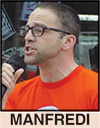 Adam Manfredi, graduate student and instructor at Washington University, who also tutors at a local prison, talked about how difficult it is for him to make ends meet and make payments on his student loans. This year, an unexpected health crisis left him with $5,000 in medical bills.
Adam Manfredi, graduate student and instructor at Washington University, who also tutors at a local prison, talked about how difficult it is for him to make ends meet and make payments on his student loans. This year, an unexpected health crisis left him with $5,000 in medical bills.
Manfredi is member of the Washington University Graduate Workers Union, which is demanding $15 and free childcare for all campus workers. The group held demonstrations at the university last month and set up an encampment on campus to draw attention to the low pay of graduate workers and other campus employees.
“My pay as a graduate worker is barely enough to cover my monthly expenses,” Manfredi said. “I have no savings. And to pay off my medical bills, I had to stop paying off my student loans. For the past four years, I worked hard to pay every single loan. Now, much of that work has been erased. Making $15 an hour means I won’t have to worry about my car breaking down. I won’t have to worry about unexpected medical bills. I won’t have to figure out how to pay for a flight home to see my nieces and nephews.
“I’m here today because the Show Me $15 movement has supported our movement,” he said. “I’m here today because our employers, both of which are multi-billion-dollar companies that are the two biggest employers in St. Louis, don’t want us working together. I am here today because I cannot wait another day. I am here today because you cannot wait another day. I am here today because we cannot wait another day.”
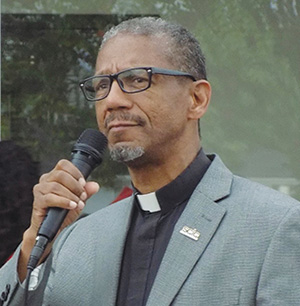
‘THIS AIN’T NO JOKE’
Rev. Darryl Gray, 63, of the Missionary Baptist State Convention, a prominent civil rights activist, who marched alongside iconic civil rights figures such as Ralph Abernathy, who succeeded Dr. Martin Luther King Jr. as head of the Southern Christian Leadership Conference, told the strikers, “I’ll be out here every time you show up.
“The folks that I see here, these are folks I deal with every day, they’re in my church,” he said. “These are families that I deal with every day.
“This ain’t no joke. This stuff is real. When you don’t make enough to take care of your family and you’ve got to struggle, you’ve got two jobs, who’s taking care of the children at home? It’s causing family breakups. It’s causing stress. It’s causing alcoholism. It’s causing drug addiction. This stuff is real and everybody is affected. Families are affected, communities are affected, we’re all affected.”
McDonald’s worker Betty Douglas said, “When I started working for McDonald’s, I was making $7.25. It took eight years for me to make $10. Just think, if I was making $10, I could buy me a car. I wouldn’t have to walk 10 blocks to get to a MetroLink. I could buy me a refrigerator. I could fix my house. I could get the necessities. I can’t do that on $10 an hour. It’s still hard.”


